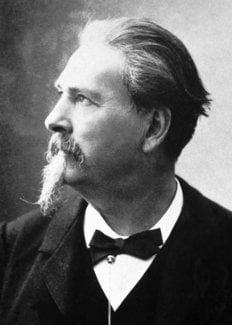Frédéric Mistral
Biographical

Frédéric Mistral (1830-1914) came from an old and well-to-do family of landowners that had settled in Provence in the sixteenth century. He was deeply influenced by his early years in the leisurely and patriarchal manor of his father. Mistral read law, but after taking his degree devoted himself entirely to writing poetry in Provençal, the passion for which had been aroused during his school days by one of his masters, the Provençal poet Joseph Roumanille. Mistral’s aim was to make neo-Provençal a literary language conforming to fixed standards of purity. For this purpose he spent many years on the compilation of the Trésor dóu Félibrige, a dictionary of Provençal published by the «Felibrige», a literary society that Mistral had founded.
Mistral was both an epic and a lyrical poet. His work is determined by Provence, not only in language, but in content and feeling. Provence is the true hero of all his poems. His first great success was Miréio (1859), a story of two star-crossed lovers. It was followed by Calendau (1867), a fantastic narrative poem about a Provençal fisherman. Other works include Lis Isclo d’or (1876) [Islands of Gold], a collection of poems; «Nerto» (1884), a narrative poem based on a chronicle of the Avignon Popes; La Rèino Jano (1890); and Lou pouémo dóu rose (1897) [The Song of the Rhone]. A five-volume edition of his works appeared between 1887 and 1910; three volumes of unpublished works appeared posthumously (1926-30). Mistral wrote an autobiography Moun espelido: Memori è raconte (1906) [Memoirs of Mistral]. His efforts to revive Provençal were at various times supported by the Academie Française and the Institut de France.
This autobiography/biography was written at the time of the award and first published in the book series Les Prix Nobel. It was later edited and republished in Nobel Lectures. To cite this document, always state the source as shown above.
Frédéric Mistral died on March 25, 1914.
The Nobel Foundation's copyright has expired.Nobel Prizes and laureates
Six prizes were awarded for achievements that have conferred the greatest benefit to humankind. The 12 laureates' work and discoveries range from proteins' structures and machine learning to fighting for a world free of nuclear weapons.
See them all presented here.
